 It is said that when St. Catherine of Siena was in dialogue with God during one of her ecstasies God said to her, "I am who am; you are she who is not." That is a most humbling statement for one to receive, to say the least. And for one who is now considered a Doctor of the Church it is amazing that God would say this to her. It seems as if God was trying to put things into perspective as to what the nature of their relationship really was. It seems that reflecting on St. Catherine could teach us all a little about what that statement may have meant for her, especially because this is her feast day. It seems like a shocking thing for God to have followed the statement, "I am who am," (which we know is how He identified Himself to Moses), with "you are she who is not." We know that God has always existed and that He has no beginning or end, even though that is a great mystery which we are unable to comprehend. Clearly St. Catherine existed, so to say she "is not" does not imply that she had no existence or that somehow God was banishing her from His thoughts. Nor was God telling her that she was unimportant in any way. Instead, He seemed to be reminding her that she needed to totally rely on Him. He is God and she is not. The source of her ministry was God, the source of her spiritual gifts was God, the source of her love was God, the source of her perseverance was God, the source of her life was God. In short, the source of all she was, was God. In many places in the Dialogues, (which is the book in which her conversations with God were recorded), God called St. Catherine, "My Daughter." Their relationship was both Father to daughter and Creator to creature, and she was aware of her ultimate reliance upon Him for everything. In fact, she was so close to God that at a time when she was concerned over some temptations she faced, she asked Him: "My Lord, where were you when my heart was so disturbed by all those temptations?" His response was: "I was in your heart." That is, God was there helping her to be displeased with the temptations so that she would be empowered against them. St. Catherine was what I would call a "gutsy" woman. That is, she was never one to shrink from difficult situations or hard work. She was independent in a time when women were expected to be dependent, standing up to her mother when she was forbidden to become a religious or associate with religious women, knowing that this was her vocation. Catherine stood up to the authorities of the day in order to help the poor. She stood up to the pope, telling him to get back to Rome during the time of the Schism in the church (when there were two popes at once, both claiming authority.) She stood up to the Queen of Naples when the Queen supported the anti-pope, sending a letter in which she did not mince any words. She did not even fear the plague, going into the most stricken areas of the city to help the sick and the dying. Yet St. Catherine was docile in her relationship with God, knowing that the source of all she had was in God and not in her own powers or abilities. She completely submitted her will to His in the intimacy of their relationship. She could hear Him say, "I am who am; you are she who is not" and understand that this meant that she needed Him to do even the smallest thing. She understood what our relationship to God should be: one of gratitude to the One who gives us all. She understood that He loves us more than anyone else ever could, therefore to be docile and willing to do His will was in the best interest of her soul. A loving parent or spouse will never ask us to do anything that is not in the best interest of our soul, even if it looks strange to the rest of the world. She trusted that and it was why she rose to such sanctity. 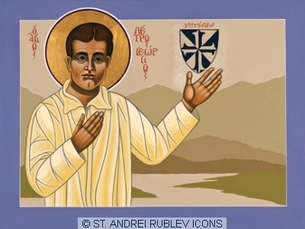 God will not call us to be another St. Catherine. He may ask us to do some things that are difficult, such as to speak out against an injustice, be it in our family, workplace, or community. He may ask us to work for the poor and ill, which may be a neighbor, or a stranger. He may ask us to be bold in living our faith as a witness to those around us. I doubt He will ask us to write the pope and tell him “what's what,” given that we have a very holy pope today! But we may be called to help others around us if we see they are turning to sinful ways. We may be called to do the corporal or spiritual works of mercy in order to bring others to Christ. The corporal works of mercy are found in Matthew 25. They involve feeding the hungry and clothing the naked; they are actions which we do to show our love by helping those in need. But the spiritual works of mercy are often overlooked. They, too, are meant to show our love, but they are more about the soul than just the needs of the body. They are:
This does not mean we are to go around in a sanctimonious way to tell people of their sins. Only the one without sin can do that, which excludes all of us, as we learn in the Gospel of John. Rather our good example, or a word of encouragement when someone does something good, can be a way to combat sinful behaviors. We may need to confront someone if the situation is one in which we are called to challenge, but it always should be done with the voice of love and compassion. We are never to set ourselves up as better than anyone else because we, too, are sinners. We are all sinners, but we are loved sinners, therefore the call is to help others with the humility to know we, too, need help from time to time. We do these spiritual works to help others who may be journeying away from God and away from His love, unwittingly. We are never to set ourselves up as "holier than thou." Not only is this a big turn off to others, but it simply is not true. This is what St. Catherine exhibited in her life. She was in need of God's help and relied on Him totally to do the work He called her to do. That humility is what enabled her to be holy. 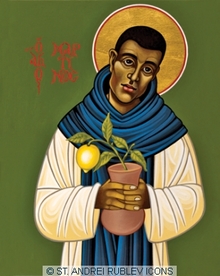 Let us seek to let God be God and for us to be His disciples. When we are humble servants it is inviting to others. If we want them to come to know Jesus or to know Him better, we need to imitate that which is loving and compassionate in the Lord. If not, all we would be doing is highlighting the faults of others, as if we have none. Not only is that hypocritical, but no one wants to be around people who seem full of themselves. Sometimes being loving means being bold, but it is always done with love and kindness, not condescension. If we are simply ourselves, faults and failings and all, and humbly bring the Gospel with love to others, we may be as influential in helping them in finding God's love as St. Catherine was in her time. She said: "The human heart is always drawn by love." (Dialogue 26) Therefore, when God says “I am who am; you are she (he) who is not," He is saying that we need to rely on Him because He is the One from who all good things flow and He alone is Lord of the Universe. We are not God, but we are His children and His disciples. And we are the instruments of His love which the world needs in order for peace and justice to be done. May we be inspired by St. Catherine to be humble in our service, yet bold in our faith! May we be filled with the Holy Spirit so as to be loving and compassionate! May we be able to recognize that all that we are comes from our Heavenly Father who is the great I AM! And may we realize the love of the Father, the Son and the Holy Spirit which is given to us freely and without reservation, no matter who we are! Let us continue to meet in the Heart of I Am Who Am, upon whom we rely for everything. Peace! **The icons are all by Rev. William Hart McNichols. The first is The Name of God, Shekinah. It depicts the letters of the tetragrammaton, which consists of the words: I Am Who Am. It can be found at http://www.standreirublevicons.com/gallery.php?action=viewPicture&id=373 The second is Blessed Pier Giorgio Frassati, who was a Third Order Dominican and was devoted to St. Catherine. I picked this icon not only because I have a great devotion to him, but because he boldly stood up for justice throughout his short life. He was a champion of the poor, but also marched in many rallies in order to speak out against the ills of fascism. The icon can be found at http://www.standreirublevicons.com/gallery.php?action=viewPicture&id=282 The last icon is San Martin de Porres, another great Dominican saint. He was renowned for his humility and service. The icon and further information about Saint Martin can be found at http://www.standreirublevicons.com/gallery.php?action=viewPicture&id=371 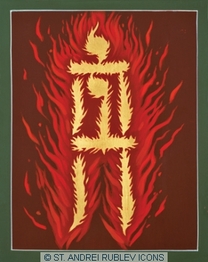 This week as we celebrated Earth Day, I began to reflect on the gift that our earthly home is to us. I thought about how many good gifts the earth provides on a daily basis. As I reflected upon this, the words God spoke to Moses when he saw the burning bush came to mind: "Take off your shoes. The ground upon which you are standing is holy ground." This verse kept repeating itself in my head, it seemed. Then it occurred to me that the ground upon which I was standing was also holy ground, not because I was somewhere extraordinary, or that I was going to be telling a prophetic message, but because it is all holy ground. In other words, everywhere is somewhere special because God made it. Therefore His hand can be seen in all that He has made. His presence is in all the earth. Therefore all ground is holy ground. It is all sacred because it is His, and it is His gift to us. It is very easy to get caught up in the daily activities of our lives and to forget the world around us. But there is so much beauty in the world which often we simply fail to see. If we allow ourselves to really see what is around us, we can be filled with wonder and awe, a gift of the Holy Spirit. I am sure that when Moses was with his flocks all he saw was the scrubby grass that the sheep were eating and the rocks around him. He may have been wondering where he would water his sheep, as he looked for a water source. Or maybe he was daydreaming, thinking about how his life turned out differently than he had expected. Whatever it was, when he saw the bush, it captured his attention immediately. When he approached it, he knew it was unlike anything he had ever seen. But unclear on holy things, when the Lord spoke his name and told him what the protocol was for being on holy ground, the Scriptures say Moses not only took off his shoes, but he fell on his face, prostrate before the bush. He recognized he was in the presence of divinity, but only because God had made an incredibly obvious visual sign that Moses could not miss. I am sure that after the dialogue with God in which Moses was told that God had a mission for him, Moses never looked at another bush in the same way again. I am sure he wondered when the next bush would burst into flame in order for God to speak to him. But little by little, Moses realized that God did not need to light everything literally on fire for him to get God's messages. Moses learned to hear God’s voice within and to see God around him at every turn. As he learned to trust God, he did not need obvious signs. And as he learned to recognize God he was able to know what God was asking and what God was giving. I believe that in essence every bush was afire with God's presence after a while; Moses learned to see God everywhere and thus everything was charged with God's presence. This is what God wants for all of us. He wants us to be able to be aware of His presence with us, but He also wants us to enjoy the gifts of beauty with which He created our world. Genesis 1 tells us that when God created everything, He saw that it was good; that phrase is repeated after every day of creation. He made everything with us in mind and gave it to us for our use. The book of Genesis also tells us that God made us the steward of all there is. It says He gave Adam and Eve dominion over everything. "Dominion" does not mean that He simply gave them power over everything. It means He gave them the task of stewardship. They were entrusted with everything He had created and so they had the responsibility of taking care of it. In a sense, that is having power over all that is created. We have the power to nurture it or to destroy it. But God wants us to see it the way He sees it; He wants us to see that everything is good, including ourselves. That has not changed. We know that although God gave humans the power to choose, we do not always choose wisely. Nonetheless, we have to try to make good choices if we are to be good stewards. The earth is no more or less ours than it was our first parents and all the people who came after them. We do not own it. Rather, it is a sacred gift, used and shared by all. The Psalms are replete with reminders of how good and sacred the earth is. Psalm 104 is one such example. In other words, the ancient people of God really did understand that the earth is the Lord's and we are given this earth as our home to enjoy. It was entrusted to us and it is filled with great beauty. Therefore we must have this understanding as well.  Today, one does not have to travel to see how beautiful the earth really is. There are photos of all types: of the world from space, of landscapes and seascapes, of "skyscapes," and of creatures great and small which also inhabit this glorious orb which we call home. All we have to do is look outside the window to see some small wonder if we have the eyes to see. If we look up we can see incredible cloud formations, and if we look carefully we can see the cycle of life in plants and creatures that roam our backyards. If we really let the Spirit open our eyes, everything can and will transform so that every bush we see really is afire with the presence of God. What it takes is not divine intervention, but the willingness to let God reveal Himself. He is already there. We simply have to let ourselves see. Often we do not see with our physical eyes alone; it is with our hearts that we see. And if we find this difficult, then we can ask the Holy Spirit to help us to see. Just as Peter had to see (in Acts 10) that there are no unclean animals, and just as he needed to see with new understanding that all people are God's people, radically changing his entire understanding of the Law he grew up with, so too can we begin to see with new eyes. Our earth is a beautiful home. It is not a home we should take for granted. It is a gift, and like all gifts it needs to be taken care of and loved. But we should also have gratitude. The earth is such a wonder and it is so beautiful that we should continually thank God for this gift. It is a gift of life for us, and it speaks to us of God. It is where He is building His Kingdom, which we "enter" when we say yes to Him. He has given us many gifts to work with, so it is up to us to say thank you by taking care of the earth and by taking care of one another. It is the message of the gospel. Pope Francis recently had this to say: The vocation of being a “protector”, however, is not just something involving us Christians alone; it also has a prior dimension which is simply human, involving everyone. It means protecting all creation, the beauty of the created world, as the Book of Genesis tells us and as Saint Francis of Assisi showed us. It means respecting each of God’s creatures and respecting the environment in which we live. It means protecting people, showing loving concern for each and every person, especially children, the elderly, those in need, who are often the last we think about. It means caring for one another in our families: husbands and wives first protect one another, and then, as parents, they care for their children, and children themselves, in time, protect their parents. Take off your shoes! The ground upon which you are standing is holy ground! Every bush is afire with the glory of God! Let us take the message of the Gospel and live it by respecting all that is created. May we have the wonder and awe of a child as we see the world as a beautiful gift! May our hearts become afire with God's love! May we be moved to gratitude for so many gifts which are given to us daily on our earth! And may we be good protectors of the earth and of everyone we care for, from our family to strangers whom we meet! Let us continue to meet on the Holy Ground which is within the Heart of the Lord, the giver of all Good Gifts. Peace! The image at the top is by Rev. William Hart McNichols and is called The Name of God, Yahweh (Masculine). It can be found at http://www.standreirublevicons.com/gallery.php?action=viewPicture&id=374 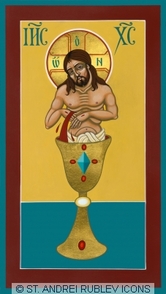 It is difficult to think of anything else this week after the incident that took place at the Boston Marathon. There were so many stories and pictures of the tragedy and there were also many stories and pictures of heroes who risked their own lives to help those who were injured. There will be more and more of these stories. What impresses me the most is that there are more stories of heroic deeds during and after the awful situation then there are of the horrific event. There are only one or two real stories about the tragedy: the event of the bombings and trying to figure out who did it. But of the heroism and goodness of those who have helped the injured and their families, there are multitudes of stories emerging. Goodness always supersedes evil, and in this case, while there is much healing to be done, I believe goodness will continue to supersede the obvious evil of the event. The story of our Church is no different. It strikes me that during our Lenten journey we focused on the suffering and death of Jesus, followed by His glorious resurrection at Easter. The readings at Mass from the Acts of the Apostles during this Easter season (since we celebrated the resurrection) have focused on the establishment of the early church. Two weeks into all the joy we come face to face with the first martyr, St. Stephen. Are we to halt the celebration as we are faced with the story of the death of a prominent and holy Christian and the persecutions that followed? The Easter season lasts for five more weeks before we come to Pentecost, the feast of the birth of the Church. In the midst of all this celebrating, we are faced with the evil perpetrated on the innocent men and women who were trying to worship their Lord and lead lives in imitation of Him. Little did they realize at first that many of them would be called to imitate Him to the full. 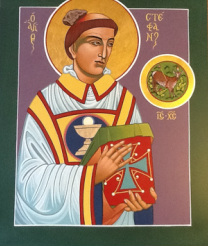 It is interesting to me that the story of St. Stephen, in some ways, parallels the recent news. There are always those "out there" in the world who seek destruction of that which is good and holy and pure. This has been true since the beginning of creation and it will remain true until Jesus returns. Jesus came to overcome the power of that evil. That is what His death is all about. He did overcome it with His death and resurrection. But that did not take away the power of temptation and evil completely; it did not take away our free will such that people are free to do good or to do evil. It gave the ultimate victory to those of us who do choose good and faithful lives because in the end we will attain heaven. We already are building the Kingdom of God which will prevail no matter what. One thing that can never be taken from us in all of this is the power of hope, the often overlooked grace of the trio, faith, hope, and love which we were given at Baptism. The early martyrs knew that Jesus did indeed save them. They also knew our faith in Him would continue to save those who came later. They knew that this faith was not cheap grace and that it would come at a price. To be truly faithful meant that they needed to hold fast to what they knew to be true and real, because they were witnesses to the death and resurrection. They heard what Jesus said when He indicated that the world would hate His disciples just as they hated Him. In other words, to follow Jesus could be dangerous in a world filled with greed, selfishness and hate. Not only did His followers believe, but they witnessed to that belief publicly. They stood up for their faith, in the face of detractors. Peter and John were arrested and beaten soon after Pentecost. And then there was St. Stephen who never made it a secret how he felt about Jesus. 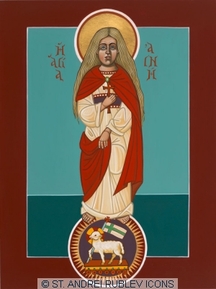 St. Stephen preached about Jesus in the Temple area, not at all intimidated by the Pharisees and Sadducees who lurked nearby. He lived what he believed. Not long after he began to preach, St. Stephen was arrested on charges of blasphemy. He never backed down or softened his approach. He witnessed to the Sanhedrin who had arrested and charged him, the same body of religious authority that handed over Jesus to the Romans. He not only continued to preach to them, but when they condemned him to death he cried out that he saw Jesus standing at the right hand of God in Heaven, which incensed them all the more. They stoned him to death on the spot. This created so much fear in the early church that many fled from Jerusalem to Antioch. But what happened next is what is fascinating. It seems that not only did Stephen's death cause Christianity to spread as the fleeing believers took their faith with them, but it caused the community to become stronger. You see, the one thing they possessed that no one really anticipated was that they had hope in the Good News. Jesus had taught them to trust in, and essentially to hope, in His power. They knew that death was overcome by resurrection. They had the gift of hope that no matter how bad things became, they would attain the promised salvation. This is why so many were able to become brave enough to face the world they lived in, even if their faith should cause them to die. They knew they would die to this life and rise to the next. But they also knew that their deaths would serve as witnesses as to the power of their hope. And they did. The more their enemies put believers to death, the more the Christian community grew. Many believed on the power of the martyrs’ witness alone. (The word “martyr” means “witness” in Greek!) And others began to truly take to heart what Jesus said to Thomas in one of his resurrection appearances: “Blessed are those who have not seen and have believed." (John 20:29) 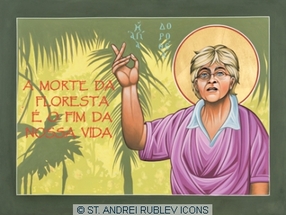 The greatest gifts given to us are the gifts of faith, hope, and love. We receive them at baptism, for many of us at infancy, for a reason. We really will need these gifts during our entire earthly journey. We need them more than anything else if we are going to make it through the temptations and assaults of this life. God wants us to be with Him in Heaven for eternity, so He gave us the most important gifts of all: the power of faith, hope, and love won by the suffering, death and resurrection of Jesus. No one can take these away from us, unless we give them away, refuse to use them, or are in ignorance of their power, and hence do not know to use them. During this most recent act of darkness let us refuse to give up on the great gifts of faith, hope, and love which our Lord won for us. We never stop being an Easter people, no matter what. This is what the martyrs such as St. Stephen taught us. The battle is not fully over until the Kingdom is complete. If we persevere even through the darkest of trials, the Kingdom will be complete and the final victory will be ours in Jesus Christ. Until then we must keep comforting the wounded, supporting each other, and loving, loving, loving. This week the pope said, "Pray for docility to the Holy Spirit - to that Spirit who comes to us and urges us forward on the path of holiness." Though his statement was in another context, it fits here. We need to rely on the Holy Spirit to get us through all of the trials before us; as we grow in holiness, so grows the Church and those around us who we will affect by our witness. Let us claim and then share our gift of hope with the world! 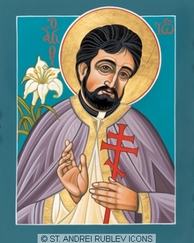 May we accept the gift of hope that goodness will ultimately overcome evil in the end! May we have faith to trust in the power of death and resurrection of our Lord, finding joy in the midst of darkness! May we have the love to reach out in healing, comfort, support, and solidarity to those around us who may be struggling! May we have the courage to pray for our enemies and those who are lost in darkness! And may we never let go of hope, as we spread it to others! Let us continue to meet in the healing Heart of our triumphant Lord. Peace to you and to all you meet! All icons are the work of Rev. William Hart McNichols. If you are interested in copies of these you can find them on his website. Links are below. The first icon is La Sangre de Cristo http://www.standreirublevicons.com/gallery.php?action=viewPicture&id=393 The second icon is Holy Protomartyr Deacon St Stephen It is not yet on Fr. Bill's website. The third icon is Holy Martyr St. Agnes Lamb of God http://www.standreirublevicons.com/gallery.php?action=viewPicture&id=395 The fourth icon is Holy New Martyr Sister Dorothy Stang http://www.standreirublevicons.com/gallery.php?action=viewPicture&id=262 The last icon is Holy New Martyr John Karastamatis of Santa Cruz http://www.standreirublevicons.com/gallery.php?action=viewPicture&id=376 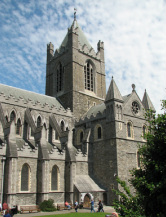 What would you do if you were walking towards your church to attend worship and you saw the following scene unfold? Two men are walking toward the church to enter for prayer, and are addressed by a seated beggar who was obviously handicapped in some way. He is clearly asking for handouts, but one of the two men who have approached says, "I have neither silver nor gold, but what I do have I give you: in the name of Jesus Christ the Nazorean, rise and walk." Most of us would think that the man who said this is a bit insane. It is clear the beggar wants money and to offer something such as miraculous healing is the height of folly, if not a bit insulting to the beggar to make such a claim. But as you watch, the man who spoke, reaches down, raises the beggar up, and the man leaps up and walks all around, clearly healed! For many of us, we would say that this would never happen or that only a charlatan would attempt to pull such a stunt. We might think that the beggar was probably a phony and that all three of the men were in on a scam. However, this is the story we read in the Acts of the Apostles which takes place just after Pentecost when the fully empowered apostles are beginning their ministry. In fact, the church is so new that beyond what happened on the day of Pentecost, they have not really done any ministry yet. It says Peter and John were going into the Temple to pray at the regular three o'clock prayer hour when they were confronted by the beggar. They had no intention of healing anyone or even attempting it until he asked them for money. But Peter not only had compassion on the poor, handicapped man, but he gave him something better than money; he gave him everything he had, which is the power of faith and healing. Another way to put this is that Peter utilized the gifts he had been given. It takes tremendous courage to say to someone in a crowded plaza that you can offer them healing. It also takes tremendous humility. First, it is humbling to honestly say one has little or no money to offer to a beggar: it was difficult to look at one less fortunate than they were and say ‘we cannot give you what you ask.’ But it takes humility to offer something even more valuable than money; something which requires faith to receive it. In other words, they needed something from the man to give him what they could. They needed his faith, or the healing would never have taken place. In some ways, they were more dependent on what he could give than what they had to offer! No one can force God's gifts upon us, not even God dares to do that. All graces are freely given to us and we freely accept (or deny) them. I am not sure we ever think about the fact that when God offers us something we have to offer something back to Him to make it work at all. What we offer back is our faith in the gift He gives. We offer back our love to His love. And hopefully we offer back our gratitude when we have received the gift. 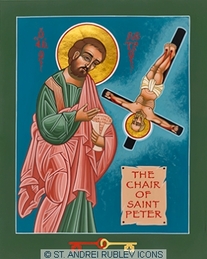 For the apostles, it took great trust that they could elicit the faith of the beggar in order for the power of God working through them to be effective. Peter and John were arrested right after they healed the beggar because the authorities were threatened by their presence and their power. "Oh no," they must have thought, "we just got rid of that pesky Jesus and now His followers are going to stir things up again." In the end, however, the authorities feared the crowds and let Peter and John go free. As for Peter and John, they remained humble and praised God for what He had done; but in healing one man, thousands became believers. As we continue through the Acts we see scene after scene of the apostles offering healing, bringing a few people back from death, and sharing the Good News everywhere they went. They trusted in the power with which Jesus ordained them when He sent them forth early on in their following, when He breathed on them after His resurrection, and when the Holy Spirit filled them. While most of us are not ordained we, too, have a mission for which we have been empowered. We have been baptized and confirmed into the faith, just as all the original followers of Jesus were. At baptism we are all given a priestly role. We are part of the common priesthood, which means we, too, are empowered to call people to their faith, just as the apostles did. While the ordained have other powers and are called to a different way of ministering which is very important, that does not mean they are the only ones called. (We need more priests, and that is part of our ministry, too: We have to call them forth!!) Some of us may ask: "What makes me think I can heal anyone, or that I can raise someone back to life?" I would say that with the gifts of faith, hope, and love which we receive at Baptism, we are not only called to do that, but we can indeed do it. Every time we meet a downtrodden person, one who is crippled by fear, hurt, loneliness, bullying, betrayal, illness, or grief and we share our acceptance and love with them, we are offering healing. Every time we say, "I forgive you," or "Please forgive me", followed by "I accept your forgiveness," we are healing another person. Every time we give someone a new chance at life, an opportunity to get ahead and out of the pit of despair because they cannot find a job or a friend, we are healing them and raising them to new life. We are called to bring life where there is none, and we are called to bring healing where there is brokenness and hurt. That is what Jesus did, it is what Peter and John (and the other apostles) did and it is what every Christian should do. Pope Francis is calling us to return to being more like Christ. He is not saying we should stop studying theology and being intellectual about our faith. But he is saying that we cannot do that without living it. All the knowledge in the world will not build the Kingdom or make us holy. It is putting it into action that makes us like Christ. It is for this that we are baptized and confirmed. And it is Eucharist that keeps the love-energy and grace flowing within us. Pope Francis has caught the eye of the world, and not just because he is a new pope, and therefore a novelty. It is because he is a servant of the people and he has a heart for the people. His call is to be mindful of the poor and downtrodden; it is of humble service and to love like Christ loves. Pope Francis is clearly very humble. He does not go for external trappings and a lot of fanfare. Instead he reaches out and touches people, both physically and spiritually. He preaches and lives nothing less than the gospel. 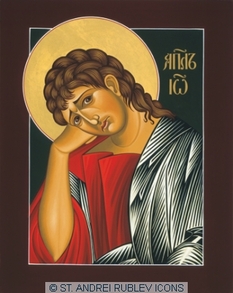 Let us put our baptismal call into action in a new way. Let us be renewed by the vigor and joy of the Easter season and the wonderful liturgies we celebrate, living humbly, but acting boldly. That is, we can boldly live our faith and hope by believing in the power given to us in the sacraments and then calling forth that power to put it into use. But we use it humbly in service, letting love be our guide. We humble ourselves by not only believing, but by depending on the faith and acceptance of those to whom we minister, no matter how weak they may be. We may need to empower them by our witness, so that they can believe at all. Who knows? The person we reach out to may be Christ in disguise! May we trust in the power of our own Baptism and Confirmation to use the gifts of the Holy Spirit we have been given! May we have the humility to trust both in God and in the gifts given, to use them as Jesus would have us do! May we have the humility to accept the people to whom we are called to reach out and to accept their gift of trust as well! May we follow the example of the apostles and of our pope to reach out to all those to whom we come in contact with love and sensitivity. Let us continue to meet in the Heart of our Risen Lord, joyfully bringing our gifts of faith, hope, and love back to Him in gratitude! Peace! The top photo is one of mine. It was taken in Dublin, Ireland. The second and third are icons by Rev. William Hart McNichols. The first is The Chair of St. Peter and is found at http://www.standreirublevicons.com/gallery.php?action=viewPicture&id=396&gall_id=18 and the one at the end is St. John the Apostle which is found at http://www.standreirublevicons.com/gallery.php?action=viewPicture&id=168 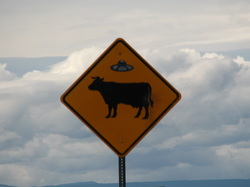 Anyone who knows me knows that I have a wicked sense of humor, especially for really groan-producing puns. I have a very vivid imagination and it fuels my love for seeing the humor in things. I think life is too short not to laugh. Humor keeps us healthy, wealthy, and wise especially if we can laugh at ourselves from time to time. One of the most important things I have learned in my life - (and today is my birthday, so I am reflecting on my life...and laughing a lot) - is that in the light of eternity, many of the things we obsess over are not all that serious. And those which are serious are easier to get through if we have a positive attitude about it. I do not mean we ought to laugh at everything and take a Pollyanna attitude, or that we should be immature about the things that really matter. There are enough things that are so serious that we would be overwhelmed if we did not find humor in what we can. But to be truly childlike, the way Jesus teaches us to be, we should be able to see the humor in much of life and let it aid us in having a positive attitude. One might even call it "Easter joy." In that vein, I would like to share a few things that were written to me over the 20-some-odd years (and some were odd!) in which I taught in a classroom. I admit I was always persnickety about some things in my teaching, such as spelling, grammar, and accuracy in detail about concepts. However, one of the chores that often brought a smile to my face (or even a guffaw), was correcting papers when they unwittingly provided me with entertainment. For example, did you know that Jesus curried Simon's mother in law? One of my freshmen “taught” me that. Another pearl of wisdom which one of my freshmen taught me is that "the rear of the Lord is the beginning of wisdom." I always have been completely behind God! (See what I mean?) A few more brilliant insights, (my comments are in parenthesis): - God sent Jesus, his only forgotten Son. (Uh oh!) - At Pentecost the Holy Spirit came and their tongues appeared to be on fire. (Too much jalapeño in the dip again?) - Luke is called "beloved physician" in Paul's letter to the Collisions. (Better get Maaco!) - God established a convent with Noah and said he would never again destroy the earth. (Pure nunsense!) Oh, and here is a triple whammy: The Lord told Damascus to go to Saul to restore his sight. He converted from Roman Catholic to the Christian religion. (Yep; three errors in one.) If you think my sophomores were exempt, think again. Here are some gems from them: -When Jesus returns, the bodies of every human will be reunited with their soles. (Quite a feet!) -St. Teresa was one of two Jews to convert to Christianity at this time, the first was Jesus. (Wait, what??) -The definition of Viaticum: the Viatican council committee that works with the Pope. (For the record, Viaticum is Reconciliation, Eucharist and Anointing given to a dying person. Oh my!) A personal favorite: St. Louis de Montfort erected Calvary scenes and crosses everywhere he went. One cross soared 50 feet. The government felt it was too large and wanted it destroyed. The end was on the Feast of the Exhalation of the Cross. (I am out of breath after that one.) I think you get the point, although I am having a difficult time stopping, especially when I see that one of my students wrote that "the three levels of Holy Orders are diaconate, Protestante and Episcopalian." (Should be presbyterate and episcopacy, which to my knowledge are not separate religions, though some might argue! Okay....just kidding!) 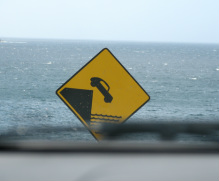 Even though I read that Jesus was born in the Jordan River, and that the man who had Him put to death was Pompous Pilate, I know my students learned something. At least I think so! Seriously, their errors provided me with a smile quite often when I was doing a very tedious task. For those of you who are non-teachers, when you have 125 or more students, many of them taking the same course, you read the same thing over and over (ad nauseam) when grading. I read every word every student ever wrote me. It was very boring sometimes, but as you can see, it was also entertaining. It also gave me insights into who they were. I really did learn a lot from them. It was a labor of love to read all of that for so many years. But without it, my life would have been so much the poorer. (And trust me, I am not laughing at my former students, but with them. Everyone who wrote something silly realized it afterward, I am sure.) Besides the importance of laughing at our own miscues, is a reminder not to think everything we hear is true or right. We need to take the time to think things through. It is easy to believe what we hear and read because it is easier than to really reflect on it. I am thinking of the commercial on TV in which the young woman believes everything she reads on the internet, including that her boyfriend is a "French model" even though he does not look anything like a model and obviously cannot speak any French! Our faith is really no different. We need to reflect on what we are taught in order to really assimilate it into our minds and hearts. But first we need to hear it. I read in Benedict XVI's book Jesus of Nazareth that he believes that one of the biggest threats to our faith is that we put our spiritual lives and our prayer time on the back burner, often putting it off for many years as if it is not as important as the day-to-day issues of our lives. The result is that our faith grows cold. We grow distant from God and we become ignorant about the basics of what we say we believe. At best we go through the motions, but our attention is elsewhere: our priorities are out of order. It is never too late to make a regular time for prayer and to take a little time each day to read from the Catechism, the Bible, or some other spiritual book. It is never too late to take a course offered at one's parish (or another parish) to refresh and renew. It is never too late to rekindle our friendship with Jesus, who I believe had a wonderful sense of humor. Hanging around the 12 apostles had to make Him laugh! Really! Can you imagine how silly Peter looked as he tried to walk on water at Jesus' invitation and then began to sink? (Mt 14: 22-33) Jesus must have roared with laughter. Or can you imagine how much God must have laughed when He made Balaam's donkey begin to speak to him? (Numbers 22:2-35) Or when He pushed down the statue to the pagan god in their temple a couple of nights in a row? (1 Sam 5:1-5. But read the entire story from chapter 4 through 5. It is a scream!) God loves it when we share our lives with Him. I think if we learned to laugh a bit at our own humanness we can become more accepting of the humanness of others. Then maybe we can be like Moses, (who was the world's first basket case....) and more like the apostles, (who I hear were instructed by Jesus to wait in Jerusalem until they resurrect at the Second Coming of Christ...oh wait, that's not right...but it is what a student said.) The point is that we can learn to not take everything so seriously that we make it a chore and a burden. Our faith is one of joy and one of resurrected life. We have left the tomb behind and are in the light of faith and love. We are an Easter people! What will attract others to our faith is our joy, and that we are humble enough to not take ourselves so very seriously.  May we have the simplicity of heart to allow ourselves to be filled with the Spirit of Joy! May we be moved to spend more time with our loving Lord, who loves the sound of our laughter! May we be inspired to delve more deeply into our own faith, in order to know the beauty and joy of being loved by God such as we are! And may we have Easter joy! Let us meet in the heart of the Lord, which is filled with joy and gladness. Peace! Oh yes...and remember not to worry: God loves a cheerful giver....but He also accepts from a grouch. Have a great day! All the photos are mine. The top is a silly sign I saw in New Mexico. These signs were everywhere! Apparently there are those who believe that in the zones where those signs are, aliens have mutilated cattle. (Not sure, but I think that is a bit of bull!) The second one is a sign I saw in Ireland, taken from the windshield of our rental car. No, we did not go off the cliff... The last is a sandpiper taken at the Gulf of Mexico. Those little guys always look like they are having fun. If you have never watched their dance with the waves, do it. You are in for a treat that is sure to produce a smile. Finally all the quotes of students are real and are in a notebook I kept for many years, commonly referred to by my colleagues as "The Book." There are so many more than the ones I included here. 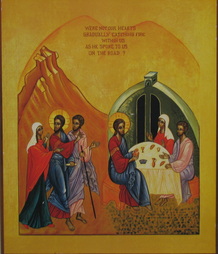 Yesterday we considered the Emmaus story from the point of view of the left side of the icon. That is, the disciples hearts were burning within them as they walked with Jesus and He explained the Scriptures to them. The two disciples taught us to be oriented totally toward Jesus, who will set our hearts aflame with the Good News. We are set aflame with His love. Today I would like to consider the right side of the icon which depicts the two disciples at table with Jesus as He breaks the bread. It is fitting that after a long day of walking and talking that they would stop to have an evening meal. Once again, they did not expect that the man who had been sharing this time with them would break the bread and then vanish. They did not expect that this man would turn out to be the Risen Christ, the one whom they previously thought might possibly be the Messiah, but who had died on the cross. Imagine their surprise when He blessed and broke the bread. Imagine their realization that it was Jesus as it registered in their minds and hearts. Before they could say a word, He was gone. But was He? Something I have always loved about this part of the story is that it says "With that their eyes were opened and they recognized Him, but He vanished from their sight." It does not say He was gone. It says He vanished from their sight. Indeed He is still present with them after He disappeared! He is the bread, blessed and broken. He is present in that bread which we call Eucharist. He has not left them, but rather He is with them in the way He promised us He would always be with us. Jesus said in John 6 that He is the Bread of Life. And at the Last Supper He told the disciples to bless and break the bread, to do it in memory of Him. Therefore we should not be surprised that He vanished from their sight, yet remained present in the bread. He remains present to us in both Word and Sacrament just as in the Emmaus story He remains present as He opens their hearts to the Word and He is present in the Bread blessed and broken. Once again, the disciples are oriented toward Jesus at the table, just as we need to be oriented toward Him in the bread and wine become Body and Blood. It is an invitation to deep communion with Him, a communion to which we have access on a daily basis. This encounter in bread and wine ought to transform us as it did those two disciples, who immediately went running back to the community from which they had come. Their hearts were filled with joy. They set out at once, in the night, after that long walk which took all day. To travel in the night is interesting because of the dangers of the darkness. At night they could have encountered highway robbers, wild animals, or Roman soldiers; or they could have fallen, or lost their way. But that they did this means they feared nothing because they had the Light which conquers all darkness. They had the light of faith and renewed hope. And they had the light of Love which illumined their minds and hearts. Are we transformed when we read the Word of God or partake in the sacrament of Eucharist? We cannot be the same after we do this. It is not really possible. Even if we cannot perceive it, we are most certainly not the same. We are filled with the very presence of God, so how could we be the same? 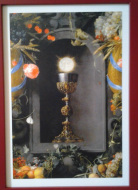 A beautiful example of this took place many years ago and it changed forever how I experience the Eucharist. I had just graduated from college and was helping with the youth choir at my parish. The chaplain at the local VA hospital called and asked if I would bring a few of the choir members and provide music for the patients, most of whom were suffering from PTSD and severe bodily injuries. One such man was in a wheel chair, obviously a quadriplegic. He could not swallow, nor did he have the ability to speak, taste, or smell. At communion the priest gave him some of the Blood of Christ, which he administered through a feeding tube that went straight to this man's stomach. The look on that mans' face when he received the Blood of Christ which he could neither taste, smell, or feel in any way, was beyond beatific. I have never seen anyone receive communion and be so visibly transformed in my life as the day that I witnessed this man receive the Blood of Christ. It changed everything for me in terms of my "understanding" of the transformative power of the Eucharist, and at that point I had not taken a single class in sacramental theology! It simply taught me more than any class ever could have about the reality of the Eucharist and what it does for us. Another way to think of it would be to imagine that right this moment Jesus enters into the room where you are in a visible way. In other words, you see Him walk through the door and He approaches you. You spend only a few moments together, maybe five minutes, and then He tells you He has to go now, but that He will always be there for you. He embraces you and says, "I love you." Then He leaves and you do not see Him anymore. After this, would you be the same? Could you be the same? I do not think anyone would be the same as they were before an encounter such as this. We would be changed. So it is with the Eucharist. Every time we receive a sacrament we have an encounter with the Living God. It is impossible to be the same. Just as the two disciples were so transformed by their encounter that they had to run back to Jerusalem immediately, freed from the darkness that had been in their hearts, freed from the terrors of the night, so too can we be transformed if we accept the grace that comes from such an encounter. The two disciples returned to the community to share their joy, to share the encounter with the apostles and other disciples still gathered in the Upper Room. And the Scriptures (Luke 24:36) say that while they were still speaking about what had happened to them and how Simon Peter had also seen Him, Jesus appeared right in the middle of the excited group. He said, "Peace be with you!" and proceeded to show them that He was indeed resurrected. This tells me that once we are transformed by the experience of Eucharist, seeing Him our midst becomes easier and easier. All we need to do is open our eyes to have faith that with each encounter He empowers us, gifts us, teaches us, renews us, heals us...whatever it is we need to be true disciples. We are no different than Cleopas and his companion. We have the same call. And we receive the same Jesus. Let our hearts become flame. This joy does not mean our problems and cares go away. But it does mean that He can help us handle these things with His grace. And it means we can receive the love He has for each of us. Let us meet at the table of the Lord where He says, "Be at peace." May we be transformed by the presence of Jesus with each encounter in the Bread! May we come to know the same joy that He offered to them and offers to us daily! Let us meet in the Eucharist. Peace! The icon is of the Road to Emmaus. This is a photo of the icon which I own. The second is a photo of a giclee (copy) of Communion Cup and Host by Jan Davidsz de Heem a 17th painter from the Netherlands. I have this giclee hanging in my home. The original is in the National Gallery in London. 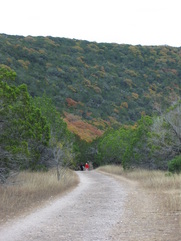 During the Easter season the story of the two disciples on the road to Emmaus is read at liturgy. We hear the story so often that sometimes we miss some of the wonderful imagery contained in it. In this case, I am thinking of a meditation on the story using an icon that I have.* The icon has two scenes on it: on the left it shows the two disciples of Jesus walking with Him, deeply listening to His words, and on the right side of the icon are the two disciples with Jesus as He breaks the bread. In each of the scenes the disciples are oriented toward Jesus, and interestingly one disciple is depicted as a man and the other is a woman. (Luke's Gospel identifies one of them as Cleopas, which is clearly a man, but never names the other. Therefore the second one could have been a man or a woman, maybe the wife of Cleopas, who is mentioned elsewhere in the Gospel!) In the scene of the two disciples walking, the two are looking intently at Jesus; that is, they are indeed oriented toward Him. The passage says they were downcast when He arrived, but that He explained the Scriptures to them. Later, after He has gone from their sight, they exclaim: "Were not our hearts burning within us while He spoke to us on the way and opened the scriptures to us?" It seems to me that their vision had been clouded by their disappointment that Jesus had died a few days before. Their expectations had been dashed. That is the problem. They believed quite possibly He was the long awaited Messiah, but then things did not go as they expected. Their expectations limited their vision. So when things went differently, even though Jesus had repeatedly said He would die and rise, they were downcast. What we can learn from this is that we need to be totally oriented toward Jesus in order to let our hearts burn with love. We need to be open to the journey and to what He calls us to; we need to be open to His voice which comes in surprising ways quite often. If we only expect Him to come to us in a particular way, we could miss Him when He does come. He wants to guide us on the journey, and He will help us when our vision is clouded. The good news here is that Jesus will help us overcome our human weakness just as He helped the two disciples understand and eventually see that, in fact, it was Him and He was alive, contrary to their expectations. The lesson here is that our expectations can limit our ability to experience His love. The grace we may need to ask for is openness to His love and openness to whatever He has planned for our journey. Often we expect it to go one way, and He has plans for it to go another way. (I have heard it said that if you want to make God laugh tell Him your plans!) And when it does not go as we expected, we get disappointed and downcast. However, just like in the Scripture and in my icon, Jesus is with us whether we recognize Him in that moment or after the fact. And He will show us the way, just as He did Cleopas and the other disciple on the road to Emmaus. 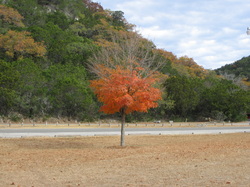 I love that these two disciples said their hearts were burning within them because it reminds me of the Burning Bush. Fire is one of my favorite images for God. He came quite often in fire throughout the Old Testament, and we still use the light of the Easter candle (and other candles) to remind us of God’s presence. God spoke to Moses through the bush that was aflame but not consumed. He identified Himself as "I AM WHO AM." This is as if to say that it is enough to know He exists: He always has been there and always will be. Moses eventually catches fire with this love which is God. His heart is burning within him and so he does something greater than he thought he was capable of doing, which is enabling the liberation of his people. He does not do this alone: it is God who works the liberation, but Moses is His instrument. At Emmaus we see that Jesus is the "I AM", the Son of God. He is resurrected and in glory. He helps the two disciples to do something greater than they thought they could do: they eventually return to the community and then go out to the ends of the earth building up the Kingdom by declaring the Good News. Many of the early disciples lost their lives as martyrs. We do not know what happened to these two. But we do know they caught fire, just as Moses did. At Easter, when the candle was lit and the proclamation sung, the lights in the church were turned back on. During the singing of the proclamation we were each holding a burning candle, lit with the fire that was blessed. The church went from darkness to light and our hearts began to burn within us, as we celebrated the reality that Jesus the Lord had indeed risen just as He had promised. It was a very moving moment. At Emmaus the disciples had such a moment: it came when they realized they had the very presence of the Risen Lord Jesus with them. Once their eyes of faith were undimmed by the enlightenment Jesus provided, they were filled with the very fire of God. Indeed, they caught fire with renewed faith, hope, and love. 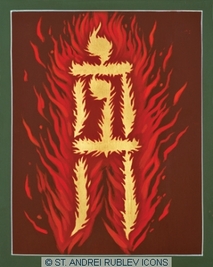 May we catch fire also! During this Easter season, let us become aware of where Jesus walks with us on our journey, and let us listen and discern how He empowers us to be disciples, enabled to do more than we thought we were capable of doing. All we have to do is whatever it is we are already doing, but to do it with love. In other words, do what you do with love, no matter how small the action seems. It is that simple. The fire of His love becomes the fire burning in our hearts, and that fire is contagious if we let it become so. If we live the Gospel message, the love with which we do things will set fire to those around us. And the best part is that He walks with us the entire time. May we be set aflame with renewed zeal to live the Gospel! May we become open to the presence of Jesus all around us that we may hear His word in our hearts! May we live in Easter joy throughout this season and beyond! Let us meet on the road with the Lord, in the fire of His love. Peace! *The icon mentioned will be in the re-post of the second part of the Emmaus entry, coming soon. I took the top photo at Lost Maples State Park in Vanderpool, Texas a few years ago. If you look closely you can see two people walking in the distance. The second photo was taken the same day as the first. I know it is not really a burning bush, but it was afire with color so it will have to do! :-) The icon is called The Name of God, Yahweh (Masculine) by Rev. William Hart McNichols. I have had a copy of this by my desk for years. It is wonderful for meditation. It is the Hebrew letters of the great revelation of God to Moses at the Burning Bush, "I AM WHO AM" (the tetragrammaton), superimposed. If you are interested in a copy or if you want more information, you can find it at http://www.standreirublevicons.com/gallery.php?action=viewPicture&id=374 A brief explanation of the tetragrammaton is found at http://www.eliyah.com/tetragrm.html 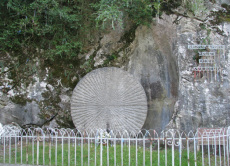 After a long Lenten season and a Triduum filled with important messages and beautiful liturgies, Easter has come. Alleluia! And Alleluia that we can sing “Alleluia” again! For the past 40 days we were missing many outward signs which are usually in our churches throughout the rest of the year. We did not sing the Gloria, we did not see much more than a lot of purple everywhere, we emphasized prayer, fasting, repentance, and almsgiving more than usual, and we certainly did not dare sing "Alleluia." For those coming into the Church there was a longing for the sacraments they sought, especially the ability to come to Holy Communion with the rest of the congregation. And I would hope that for all of us there was a longing for the joyous celebration of who we are: people of the Risen Lord. We are a people of joy. I attended some very beautiful liturgies during the Triduum along with a friend who was seeking Confirmation and first Holy Communion. It was truly a reminder to me of the gifts I have as a member of the Church and as a member of the Body of Christ. I hope that everyone in the church had the same reminder of that which we can often unwittingly take for granted, and maybe had a renewed desire in solidarity with those who longed for the reception of sacraments. My heart leapt when the lights came on after being in the dark of the Church at the Easter Vigil; it was a joy to hear the Easter Proclamation beautifully chanted. But mostly it was a renewal of my own faith and of my relationship with God when I watched the catechumens receive Baptism and the candidates receive Confirmation with them. It gives one’s faith a shot in the arm to attend the entire Triduum and live it, so to speak, with one who is coming into the Church. If you have never done this, I suggest it for next year. The greatest gift of Easter, of course, is the gift of the Risen Lord. The Triduum began with Jesus at the Last Supper giving us His body and blood perpetually as the gift of the Eucharist and then going out to become that very sacrifice on the Cross at Calvary. That amazing, unfathomable love which allowed Jesus to be arrested, abandoned, betrayed, abused, tortured, and then nailed to a cross is emblazoned in our mind and heart during the Triduum. But the Triduum ends in the triumph of the Cross, not in the darkness of the tomb. Jesus resurrected on the third day and lifted all the holy ones to Heaven along with Him, opening wide the gates for us so we may be saved from the power of sin and death for eternity. As we reflect joyfully upon this, I think it is important to also reflect on the gift of faith that we have been given. The Easter Vigil liturgy is so full of joy and longings fulfilled that it should fill us with gratitude for so great a gift as the gift of having encounters with the Living God available to us on a daily basis. We can partake in the mysteries of His death and resurrection every day at Mass. Each time we go to the Eucharist we have an Easter celebration and it should bring us the same joy as when the lights went on and we heard the first words of the Easter Proclamation, (the Exsultet): "Exult, let them exult, the hosts of Heaven..." Every Eucharist is the sacrifice of Jesus and the reality that He is the Risen Lord, not one who died and stayed locked in a tomb. He broke the bonds of death and destroyed the tomb. He did this so we would not only know the depths of His love for us and the greatness of His power, but so that we would have the life He always intended us to have: life with Him forever in joy and glory. It was, as always, about us. And it was about Love. I know the hosts of Heaven rejoiced not just on that first Easter morning, but they rejoice every time we remember it at Mass. They rejoice when we take the gifts we have been given and put them to use. They rejoice when we are filled with gratitude within our hearts for what we have been given, but the rejoicing is even greater when we put to use the gifts of faith, hope, and love which we were given in Baptism. They rejoice when we use the gifts of wisdom, understanding, right judgment, courage, knowledge, reverence and wonder and awe. They rejoice when we live the Gospels and put into practice the teachings of Jesus which help Him to continue to build the Kingdom of God. 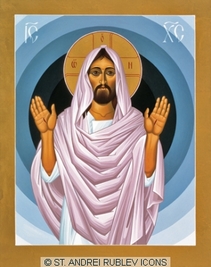 We have been given great power through the death and resurrection of Jesus. Therefore we need to use it! We also have a responsibility to use it. The power we have been given is the very power of the Holy Spirit, it is the power of God. It is easy to be joyful at Easter and to get into the spirit of the liturgies and celebrations in which the joy is palpable. It is easy to belt out the hymns along with the blare of trumpets and the voices of the rousing choir. It is easy to have a smile on one's face as we sing "Alleluia" finally after a long wait. Therefore, we need to keep that joy in our minds and hearts each and every time we go to Mass after Easter and throughout the year. The mysteries are no less great after Easter and the resurrection of Jesus is no less a reality. The power He gives us in the gifts of His Holy Spirit is no less potent during the challenges that will no doubt assail us in the year to follow. He promised us freedom and the power of our faith, hope, and love. He delivered and now it is our turn to deliver on the promises which we made at Baptism and Confirmation, the promises we renewed at the Easter liturgy. The Good News is that the One who was once dead is now alive. The Good News is that Jesus is Lord and that at His name every knee on earth and under the earth and in Heaven bows because He is Risen. The Good News is that not only did He empower us with so many great gifts, but He helps us to use them when we are weak and the challenge feels too great. He overcame so that we can overcome also: in our weakness He is strong. The Good News is that we do not have to pull ourselves up by our own bootstraps anymore. Let us let Him lift us up with Him, not only on the last day, but each and every day of our lives. Now that is truly Good News at which the Heavenly Hosts exult and say: "Alleluia, Alleluia, Alleluia! He lives! He reigns! Alleluia!" May we live in Easter joy each and every day! May we have gratitude for so great a Lord and Savior! May we live in love and fidelity to the Lord who never breaks a promise in His faithfulness to us! May we draw on the power of His resurrection in order to live our lives as people of Easter that we may assist in the work of building the Kingdom in humility and simplicity of heart! Let us meet outside the empty tomb, along with the angels, shouting our "Alleluia!" Peace and Easter Joy!! The photo at the top is from Lourdes; the Stations of the Cross end with the rolled back stone at the tomb. The icon is The Risen Christ, by Rev. William Hart McNichols and can be found at http://www.standreirublevicons.com/gallery.php?action=viewPicture&id=199 if you are interested in a copy the information is on the page. |
Heart Speaks to Heart
|

 RSS Feed
RSS Feed

